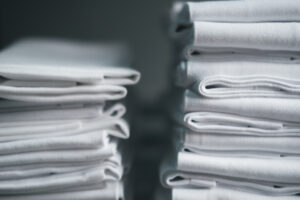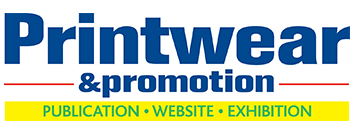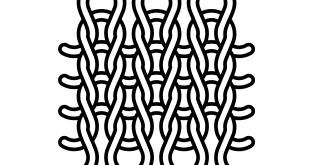
In this month’s Embroidery Column, Natalie Greetham, marketing manager at Madeira UK, takes a look at the similarities and differences between rayon and polyester threads.
The two most common types of thread for industrial embroidery are made from either rayon viscose or polyester and most embroiderers will have a favourite that they’ve been using for years, but is using the same thread type the best option for every job?
Rayon and polyester threads have many similarities; both are available in standard 40 weight and a 75/11 needle would normally be used. Both can run at high speeds without breaks and can be washed at high temperatures, 95°C. In the Madeira range, both are available on large 5000m cones and 1000m cops in over 400 shades. Most colours have been Pantone matched, essential for accurately converting customer branding.
So, with both threads offering fantastic results on high-speed machines, how do you know if you are using the right thread for your project? The answer lies with the end use of the product to be embroidered. This will dictate which thread type you should select.
Similarities and differences
We’ve looked at the similarities, so now let’s look at the differences…
Rayon is made from wood-pulp, a natural cellulose raw material obtained from trees. Renowned for its high tensile strength and flexibility, a good quality rayon thread, such as Madeira’s Classic, will lie flat when stitched in any direction and remain soft to the touch even at high stitch counts. Its softness makes rayon a firm favourite for many applications especially items that may be worn close to the skin.
The versatility of rayon makes it the most popular thread type among UK embroiderers. It will also be gentler on your machine and requires a lower tension setting. Being a natural fibre rayon will be more susceptible to cold, damp, or humid conditions, allowing them to warm up to room temperature will optimise results. These threads will not be a suitable choice if bleaching agents may be used during washing.
If your embroidery business produces items that may be subjected to harsh laundering conditions with bleaching agents such as commercial linens or chef’s whites, then polyester is the thread you should be using. Good quality 100 % polyester thread, like Madeira’s Polyneon range, are bleach and chlorine resistant and will hold their colour. While polyester threads are indeed stronger and more durable in extreme conditions, this can sometimes lead to problems during embroidering.
Polyester thread will stretch during stitching which may cause puckering and looping once the design is removed from the hoop and the thread returns to its original shape. Whether running rayon or polyester, setting the machine tensions correctly and changing needles regularly will go a long way to help avoid issues such as puckering, looping and thread breaks and will ultimately improve the quality of the finished embroidery.
Both types of threads are available in different weights, remember the higher the number the finer the thread. Using a thicker 30 weight thread is a cost-effective option for filling larger areas in a design, by reducing the stitch density and the number of stitches, 20% less thread is required. For fine details and lettering switching to a 60 or even 75 weight thread can really improve clarity.
Companies looking towards an eco-friendlier future will be pleased to know sustainable thread options are now available. Madeira have introduced two new threads from sustainable raw materials.
Polyneon Green made from PET plastic bottles, a raw material in abundance is far better recycled into vibrant polyester embroidery thread than thrown away into the ocean and Sensa Green the first coloured embroidery thread produced from lyocell fibres derived from trees sourced from sustainably managed forests. Always choose high-quality thread and look for those with certification to back up the thread’s safety for use and environmentally friendly production processes.
 Printwear & Promotion The Total Promotional Package
Printwear & Promotion The Total Promotional Package




